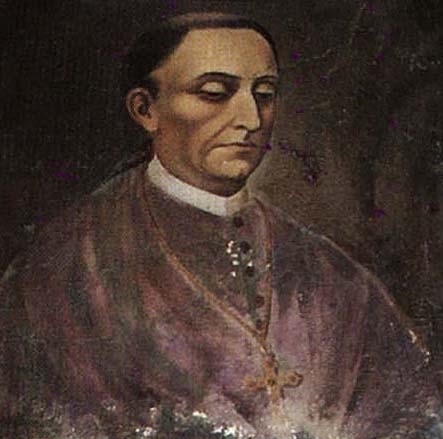Diego de Landa
Contents |
The conversion of the Maya
Born in Cifuentes, Guadalajara, Spain, he became a Franciscan monk in 1541, and was soon sent as one of the first Franciscans to the Yucatán. Landa was in charge of bringing the Roman Catholic faith to the Maya peoples after the Spanish conquest of Yucatán. He presided over a spiritual monopoly granted to the Catholic Franciscan order by the Spanish crown, and worked diligently to buttress the order's power while converting the indigenous Maya. His initial appointment was to the mission of San Antonio in Izamal, which served also as his primary residence while in Yucatán.
He is the author of the Relación de las Cosas de Yucatán in which he catalogues the Maya language, religion, culture and writing system. This manuscript was written around 1566 on his return to Spain; however, the original copies have long since been lost. The account is known to us only as an abridgement, which in turn had undergone several iterations by various copyists. The extant version was produced around 1660, and was discovered by the nineteenth century France cleric Charles Etienne Brasseur de Bourbourg in 1862. Brasseur de Bourbourg published the manuscript two years later in a bilingual French-Spanish edition, entitled Relation des choses de Yucatán de Diego de Landa.
Inquisition accusation
Suppression of the Maya
After hearing of Roman Catholic Maya who continued to practice "idolatry", he ordered an Inquisition in Maní, Yucatán ending with a ceremony called auto de fe. During the ceremony on July 12, 1562, a disputed number of Maya codices (or books; Landa admits to 27, other sources claim "99 times as many") and approximately 5,000 Maya cult images were burned. The actions of Landa passed into the Black Legend of the Spanish in the Americas.
Only three Pre-Columbian "books" of Maya hieroglyphics (also known as a codex) and, perhaps, fragments of a fourth are known to have survived. Collectively, these works are known as the Maya codices.
Landa's Inquisition showered a level of physical abuse upon the indigenous Maya that many viewed as excessive, and was at the very least unusual. Scores of Maya nobles were jailed pending interrogation, and large numbers of Maya nobles and commoners were subjected to examination under "hoisting." During hoisting, a victim's hands were bound and looped over an extended line that was then raised until the victim's entire body was suspended in the air. Often, stone weights were added to the ankles or lashes applied to the back during interrogation.
Some contemporary observers were troubled by this widespread use of torture. Crown fiat had earlier exempted indigenous peoples from the authority of the Inquisition, on the grounds that their understanding of Christianity was "too childish" to be held culpable for heresies. Additionally, Landa dispensed with much of the extensive formal procedure and documentation that accompanied Spanish torture and interrogation.
Consecrated as bishop
Landa was sent back to Spain by Bishop Toral, to stand trial for conducting an illegal Inquisition. His actions were strongly condemned before the Council of the Indies. This resulted in a "committee of doctors" being commissioned to investigate Landa's alleged crimes. In 1569 the committee absolved Landa of his crimes. Bishop Toral died in Mexico in 1571, allowing King Phillip II of Spain to appoint Landa as the fourth appointed bishop of Yucatán.
This site costs a lot of money in bandwidth and resources. We are glad to bring it to you free, but would you consider helping support our site by making a donation? Any amount would go a long way towards helping us continue to provide this useful service to the community.
Click on the Paypal button below to donate. Your support is most appreciated! |
|---|



